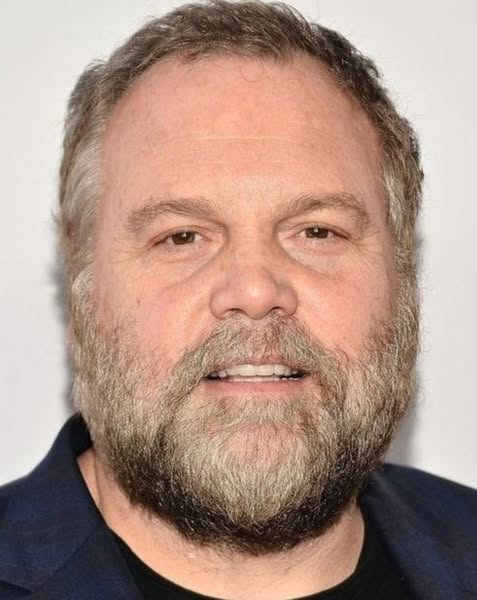Vincent D’Onofrio’s career stands as one of Hollywood’s most fascinating examples of total artistic dedication. For more than four decades, he has been known for disappearing completely into his roles, transforming both physically and emotionally to bring characters to life in a way few others have dared. From the intense realism of Full Metal Jacket to the psychological complexity of Law & Order: Criminal Intent and the commanding presence of Wilson Fisk in Marvel’s Daredevil, D’Onofrio has shown time and again that acting is not just a profession for him — it is a craft of deep transformation.
But before the fame, the acclaim, and the iconic performances, he was simply a young stage actor in New York City, struggling to make ends meet while chasing a dream that demanded everything from him. His journey to becoming one of Hollywood’s most respected performers was not quick, easy, or glamorous. It was built on persistence, humility, and an unwavering belief in the power of storytelling.
Early Life and Influences
Born in Brooklyn, New York, Vincent Philip D’Onofrio grew up in a creative but modest household. His father, a barber who later managed a local theater, and his mother, who eventually married writer and producer George Meyer, introduced him to art and performance at a young age. This environment gave D’Onofrio an early appreciation for film, music, and live theater.
As a child, he spent a lot of time in his own imaginative world. He wasn’t the loudest or most outgoing kid, but he was curious — always watching people, listening to conversations, and thinking about how others felt. When his family relocated to Florida, he found new ways to express that curiosity. He discovered a fascination with magic and illusion, spending hours practicing sleight-of-hand tricks taught by Cuban performers at a nearby shop. These early interests in performance and transformation hinted at the kind of actor he would later become — someone who could make audiences believe in the impossible.
Discovering Acting
After finishing school, D’Onofrio returned to New York, determined to study acting seriously. He trained in small workshops, worked with local theater groups, and took on any opportunity to perform — often for little or no pay. Like many artists trying to make it in the city, he supported himself through an array of odd jobs.
At various times, he worked as a cab driver, florist, drapery hanger, and nightclub bouncer. He even served as a bodyguard for celebrities like Yul Brynner and Robert Plant. Though the work was often exhausting, these experiences gave him a better understanding of people from all walks of life — something that would later enrich his performances on screen.
Despite the hardships, D’Onofrio never lost sight of his goal. He built his reputation slowly in the New York theater scene, appearing in both Broadway and off-Broadway productions. His versatility and dedication caught the attention of peers and directors, but what he truly needed was a film role that would introduce him to a larger audience.
The Role That Changed Everything
That opportunity came in the mid-1980s when his friend, actor Matthew Modine, told him about an upcoming Stanley Kubrick film titled Full Metal Jacket. The project promised to be a bold, intense depiction of the Vietnam War, exploring how military training could transform ordinary young men. D’Onofrio sent in an audition tape and, to his surprise, received interest from Kubrick himself.
The legendary director saw potential in D’Onofrio for the role of Leonard “Private Pyle” Lawrence — a character whose journey from innocence to despair would serve as one of the film’s emotional anchors. But Kubrick had one major requirement: D’Onofrio needed to look physically different from the strong, athletic man he was at the time.
He was asked to gain significant weight for the part, to embody a recruit who struggles under the pressures of training. D’Onofrio, known for his total commitment to every role, agreed without hesitation. Over the next several months, he underwent an intense physical transformation.
A Physical and Emotional Commitment
By the time filming began, D’Onofrio had gained close to 80 pounds — a record-setting transformation in Hollywood at the time. The change was so complete that even people who knew him well were shocked by his new appearance. His performance on set demanded immense endurance. Scenes involving boot camp drills, running, and long shooting days became physically challenging, but he refused to let those difficulties affect his performance.
Kubrick, known for his perfectionism, pushed D’Onofrio and the rest of the cast to deliver performances that were both authentic and emotionally raw. D’Onofrio responded with total focus. His portrayal of Private Pyle was haunting and deeply human, capturing both the vulnerability and the internal collapse of a man under immense pressure.
When Full Metal Jacket was released in 1987, audiences and critics were struck by the emotional power of his performance. Many described it as one of the most unforgettable roles in modern cinema. Overnight, Vincent D’Onofrio went from an unknown theater actor to a major name in Hollywood.
The Aftermath of Transformation
While the film made him famous, it also brought unexpected challenges. The drastic physical change took time to reverse, and the experience left him emotionally drained. In interviews, D’Onofrio would later say that the transformation changed the way people perceived him — both in the industry and in everyday life.
When he eventually returned to his original weight, it took time for casting directors and audiences to see him as anything other than Private Pyle. But instead of being discouraged, D’Onofrio used that challenge as motivation. He continued to take on diverse and unconventional roles, determined to prove his range as an actor.
Building a Lasting Career
The years following Full Metal Jacket saw D’Onofrio working tirelessly across genres and mediums. He appeared in dramas, thrillers, comedies, and science fiction films, each time disappearing completely into the role. His ability to transform earned him a reputation as a “chameleon actor” — someone capable of embodying anyone, from heroes to villains, from everyday men to extraordinary figures.
In the 1990s, he appeared in Men in Black, The Cell, and Ed Wood, showcasing his adaptability. But it was television that brought him his next wave of success. In 2001, D’Onofrio joined Law & Order: Criminal Intent as Detective Robert Goren. The character — a brilliant but complex investigator — became one of the most distinctive in the entire Law & Order franchise.
His portrayal of Goren was nuanced and intellectual, exploring the psychology of both criminals and investigators. The show ran for a decade, and D’Onofrio’s performance earned praise for its intelligence, intensity, and emotional depth.
A Force in the Marvel Universe
In the 2010s, D’Onofrio entered yet another chapter of his career with his role as Wilson Fisk, also known as the Kingpin, in Marvel’s Daredevil series. His version of Fisk stood out for its complexity — a man capable of both ruthless power and deep vulnerability. Fans and critics alike hailed his portrayal as one of the finest in any superhero adaptation.
He later reprised the role in other Marvel projects, including Hawkeye and Echo, proving that even in a world of comic-book giants, he could bring a grounded, human dimension to a larger-than-life character.
Beyond Acting: Writing, Directing, and Mentorship
D’Onofrio’s creative pursuits extend far beyond acting. Over the years, he has written poetry, directed independent films, produced projects for new filmmakers, and even published a book. His interest in the process of storytelling — not just the performance — reflects his belief that art is collaborative and ever-evolving.
He often mentors younger actors, encouraging them to approach the craft with patience and authenticity. To D’Onofrio, success is not about fame or wealth but about truthfully connecting with an audience, no matter the size of the stage or screen.
Personal Life and Legacy
Behind the camera, D’Onofrio’s life has been marked by both love and change. In the early 1990s, he was in a relationship with actress Greta Scacchi, with whom he shares a daughter, Leila George — now a talented actress herself. Later, he married Dutch model Carin van der Donk, and the couple had two sons before eventually separating in 2023.
Though his personal life has seen its share of transitions, D’Onofrio has always balanced his family commitments with a steady career. His children have spoken fondly of his dedication not only as an actor but as a father who values creativity, empathy, and hard work.
Enduring Influence
Today, Vincent D’Onofrio continues to work in film and television, taking on new challenges with the same fearless approach that defined his early career. He has appeared in critically acclaimed projects such as The Unforgivable alongside Sandra Bullock and Dumb Money, further demonstrating his range and longevity.
His story serves as an inspiring reminder that true artistry often requires sacrifice, transformation, and a willingness to go where others will not. D’Onofrio’s career has been a masterclass in reinvention — proof that even in an industry obsessed with appearances, substance and skill endure.
Reflection
When asked about his early break, D’Onofrio often credits Stanley Kubrick for giving him the chance to show what he could do. “Stanley made my career,” he has said in interviews. “There’s no question about that.”
Yet his journey after Full Metal Jacket reveals that talent alone was never enough. What set him apart was his ability to adapt, evolve, and commit entirely to his craft, even when it demanded personal change.
More than 35 years after that defining role, people still talk about Vincent D’Onofrio’s transformation — not just the physical one, but the artistic one. He took a risk few would take and emerged with a performance that continues to be studied by actors and film students around the world.
In doing so, he earned not only fame but something deeper — a legacy built on courage, discipline, and integrity.
Vincent D’Onofrio remains, above all, an artist devoted to the truth of his characters. His story is one of resilience, creativity, and the unwavering pursuit of authenticity. For audiences, his work continues to serve as a reminder that the best performances are not about looking perfect — they’re about showing what it truly means to be human.

